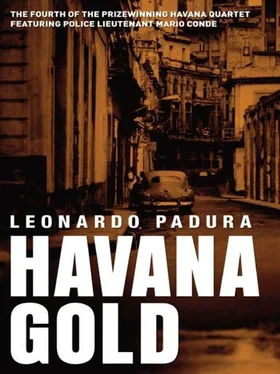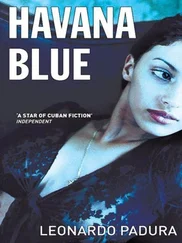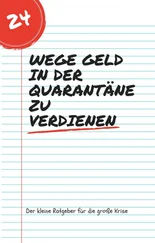“Fire away,” said Manolo switching the engine on. The Count looked at his watch for a moment: it was just 2 p.m. and he felt the unpleasant sensation of having time on his hands.
“Turn into Juan Delgado and park on the corner of Milagros.”
“Where we going now?”
“I’m going to see a friend,” the Count mumbled when the car stopped a few blocks on. “Wait here. I’ve got to go by myself,” he said getting out of the car and lighting up.
He walked down Milagros into the relentless wind and dust. His skin smarted again with the heat from that breeze sent from hell. He had to talk to Candito, had to rid himself of all commitments on that night he’d already staked out, and he had to have the info.
The passageway on the site was also deserted by that time in the early afternoon, so ideal for a nap, and he breathed with relief when he heard the tapping of a hammer from Red Candito’s home-made mezzanine. Hard at it. Cuqui asked “who’s that?” from inside, and he smiled.
“The Count,” he answered quietly, and waited for the young woman to open the door. Three or four minutes later, it was Candito who opened up. He was wiping his hands on a dirty rag and the Count realized he wasn’t particularly welcome.
“Come in, Conde.”
The lieutenant looked at Red before going inside, trying to imagine what his old pal from Pre-Uni was thinking.
“Sit down,” said Candito, filling two glasses with milky alcohol from an unlabelled bottle.
“Gut-rot?” enquired the Count.
“It goes down a treat,” replied Red and drank.
“If it’s not too rough,” conceded the Count.
“What do you mean ‘rough’? This is a Don Felipón, the best gut-rot made in town. It costs fifteen pesos a time and you have to order it in advance. A limited edition, you know. You can’t wait, don’t tell me?”
“I can never wait. You know me.”
“But I’ve to take it easy, pal. I’m risking my neck.”
“Don’t fuck around, Red, this isn’t the Sicilian mafia.”
“You believe that if you want. Where there’s grass, there’s brass, and where there’s brass there are people who want to hang on to it. And it’s boiling hot out there, Conde.”
“So there is dope around?”
“Yes, but I don’t know where it hails from or where it’s heading.”
“Don’t try to fob me off, Red.”
“Hey, you think I’m God the Father the all-knowing?”
“And more besides?”
Candito took another sip of spirits and looked at his old schoolmate.
“Conde, you’re changing. Watch it, you’re a nice guy, but you’re turning cynical.”
“Sod it, Red, what’s got into you?”
“You mean, what’s got into you, my friend? You’re using me and you don’t care a fuck. All you care about is sorting your problem…”
Conde looked into Candito’s bloodshot eyes and felt disarmed. He felt like leaving but listened instead to his informer’s spiel.
“Pupy’s a young devil. He’s into everything: he nicks bikes, sells the parts, buys greenbacks, deals with foreigners. He lives like a lord. Just look at his bike, a Kawasaki, a 350 I reckon, real sweet. What else would you like to know?”
The Count looked at his nails, pinkish, so different to Candito’s long dark specimens.
“Grass as well?”
“Yes, you bet.”
“He’s got to be on file.”
“That’s down to you. You’re the cop.”
The Count finished his shot and lit up. He looked into Candito’s eyes.
“What’s got into you today?”
Candito tried to smile, but couldn’t. He put his glass on the floor without taking another sip and started cleaning a nail.
“What do you think, Conde? What do you think’s got into me? You know the street out there, you weren’t born yesterday and you know what I’m doing doesn’t go down well. It’s no picnic. Why don’t you let me get on making my shoes without all this dirt? I feel ashamed to be doing this, right? Do you know what it means to be a snitch? Come on, Conde, what’s in it for me? You think I’m going to finger people and live a quiet life?…”
The Count stood up when Candito picked up his glass and finished his drink. He knew very well what was riling his friend and he knew that any attempt at self-defence would ring untrue. Yes, Candito was his informer: on the street, his snitch, nark or squealer. He looked at his friend, who’d defended him more than once and felt dirty, guilty and cynical as he’d just called him. But he had to have the info.
“I know you think I’m a bastard, you’re probably right. You tell me. But I have a job to do, Candito. Thanks for the drink. Say hullo to your little raver. And remember that I want to give some sandals to a little piece I met,” and he shook the calloused, gluey palm Red Candito offered up from the depths of his armchair.
The wind combed the main street in his barrio as if trawling for dirt and dust were its only mission in the world. The Count found it hostile and resolute, but decided to take it on. He asked Manolo to drop him on the corner by the cinema though he didn’t tell him he only wanted to walk, to walk round his barrio on a day that didn’t favour such exercise for legs and spirit, because the stress of waiting seemed as if it would be the end of him. Sergeant Manuel Palacios had learned from almost two years of working and co-existing with the Count that there was no point asking questions when his boss asked him to do something unusual. Conde’s reputation as a lunatic at headquarters wasn’t mere gossip and Manolo had experienced it more than once. His mixture of pigheadedness and pessimism, of nonconformity and pugnacious intellect were components of a mind that was too strange and effective to be a policeman’s. But the sergeant admired him, as he’d never admired anyone else, for he knew that working with the Count was at once a party and a privilege.
“See you, Conde,” he said before making a U-turn in the middle of the main street.
The Count looked at his watch: it was almost four and Karina would never ring him before six. Will she call? He wondered as he walked into the wind, not even bothering to take a quick look at what was showing at the cinema it had taken ten years to refurbish. Although his body was desperate to be horizontal in bed, the speed at which ideas were spinning round his head would defeat any attempt to shorten his wait with the oblivion of sleep. Anyway that solitary stroll through the barrio was a pleasure the Count allowed himself from time to time: his grandparents, father, uncles and aunts and he himself had been born in that exact location and wandering down that high street – that had carpeted the ancient path along which came the best fruit from the groves in the south – was to go on a pilgrimage into himself, to boundaries that now belonged to memories he had acquired from his family elders. From the time the Count was born to that moment that route had changed more than in the previous two hundred years – when the first Canary Islanders founded a couple of villages beyond the barrio and began to trade in fruit and vegetables, later to be joined by a few dozen Chinese. A dust track and a few wood-and-tile houses on the outer limit gradually brought those remote ends of the earth to the hubbub of the capital and, in the era when the Count was born, the barrio was part of the city, and was filled with bars, liquor shops, a billiards club, ironmongers, chemists and a modern, efficient bus station, set up to make it possible for the barrio to participate in city life. Nights started to become long, busy and lit up, with a poverty-stricken, laid-back cheerfulness the Conde could only remember. As he walked into the wind on his way home, letting the gusts sweep away these idle reflections, Conde felt once more the sentimental communion tying him to that dirty, badly painted street where many things that had featured in his ragbag memories had long disappeared: Albino’s fry-up stall, next to the school where he studied for several years; the bakery, where he went every afternoon to buy large warm loaves; the Castillito bar and its juke-box voices that found drunks to sing along with; Porfirio’s liquor shop; the bus-drivers’ union; Chilo and Pedro’s barbers’ shop, destroyed by the only really fierce fire in the barrio’s history; the dance hall, turned into a school, where one day in 1949 a couple of adolescents found mysterious emotional bliss after only just learning of each other’s existence, becoming his parents a few years later; and the notable absence of the cockpit where his grandfather Rufino the Count forged his dreams of greatness, now a barren waste without a single trace of those big cages, the smell of feathers, the fighting arenas and even the prehistoric shapes of the tamarinds which he’d learned to climb under his grandfather’s expert gaze. Despite his sadness at the gaps, and his nostalgia for what was gone for ever, that was the space where he’d grown up and learned the first laws of a twentieth-century jungle as raw in its dictates as the rules of a Stone Age tribe: he had learned the supreme code of masculinity that stipulated that men were men, something you had no need to trumpet, only to demonstrate whenever the opportunity arose. And as the Count had had to demonstrate several times in that barrio, he wasn’t worried about having to do so once more. The image of Fabricio unleashed a rage he couldn’t restrain that boomeranged round his memory. And I won’t have any truck with him, he told himself, as he arrived home and tried yet again to cast out that troublesome image and think of a future full of hopes and possible loves.
Читать дальше











